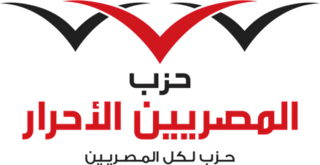
The New Wafd Party, officially the Egyptian Wafd Party and also known as the Al-Wafd Party, is a nationalist liberal party in Egypt.

Elections in Egypt are held for the president and a bicameral legislature. The president of Egypt is elected for a six-year term by popular vote after draft amendments to the 2013 constitution altered the presidential term limits from the original four years to six years.

The National Democratic Party, often referred to in Egypt as simply the National Party, was the ruling political party in Egypt from 1978 to 2011. It was founded by President Anwar Sadat in 1978. The NDP wielded uncontested power in state politics, usually considered a de facto single party, with authoritarian characteristics, inside an officially multi-party system, from its creation until the resignation of Sadat's successor Hosni Mubarak in response to the Egyptian Revolution of 2011.

Kefaya is the unofficial moniker of the Egyptian Movement for Change, a grassroots coalition which prior to the 2011 revolution drew its support from across Egypt's political spectrum. It was a platform for protest against Hosni Mubarak's presidency and the possibility he might seek to transfer power directly to his son Gamal; political corruption and stagnation; "the blurring of the lines between power and wealth; and the regime's cruelty, coercion and disregard for human rights."

Presidential elections were held in Egypt on September 7, 2005, the first to feature more than one candidate. Incumbent president Hosni Mubarak was re-elected for a fifth consecutive six-year term in office, with official results showing he won 88.6% of the vote. Mubarak's main opponent, Ayman Nour, of the El-Ghad Party, is estimated to have received 7.3% of the vote and Numan Gumaa received 2.8%, however, Nour claimed that prior polling results showed over 30%. Criticism of the election process has centred on the process of selecting the eligible candidates, and on alleged election-law violations during voting. Mubarak was sworn in for his new term on September 27.
The Muslim Brotherhood is an Islamic organization that was founded in Ismailia, Egypt by Hassan al-Banna in March 1928 as an Islamist religious, political, and social movement. The group spread to other Muslim countries but has its largest, or one of its largest, organizations in Egypt, where for many years it has been the largest, best-organized, and most disciplined political opposition force, despite a succession of government crackdowns in 1948, 1954, 1965 after plots, or alleged plots, of assassination and overthrow were uncovered. Following the 2011 Revolution the group was legalized, and in April 2011 it launched a civic political party called the Freedom and Justice Party (Egypt) to contest elections, including the 2012 presidential election when its candidate Mohamed Morsi became Egypt's first democratically elected president. One year later, however, following massive demonstrations, Morsi was overthrown by the military and arrested. As of 2014, the organization has been declared a terrorist group by Russia, Egypt, UAE, Saudi Arabia and is once again suffering a severe crackdown.

Parliamentary elections were held in Egypt in three-stage elections in November and December 2005 to elect 444 of the 454 members of the People's Assembly. The elections formed the Eighth Assembly since the adoption of the 1971 Constitution. A total of 5267 candidates competed in 222 constituencies for the Assembly's 444 elected seats.

Local elections were held across Egypt on 8 April 2008.

Presidential elections were held in Egypt in 2012, with the first round on 23 and 24 May 2012 and the second on 16 and 17 June. They were the first democratic presidential elections in Egyptian history. The Muslim Brotherhood declared early 18 June 2012, that its candidate, Mohamed Morsi, won Egypt's presidential election, which would be the first victory of an Islamist as head of state in the Arab world. It was the second presidential election in Egypt's history with more than one candidate, following the 2005 election, and the first presidential election after the 2011 Egyptian revolution which ousted president Hosni Mubarak, during the Arab Spring. However, Morsi's presidency was brief and short-lived. He later faced massive protests for and against his rule, only to be ousted in a military coup in July that year.

National Association for Change(Arabic: الجمعية الوطنية للتغيير) is a loose grouping of the various Egyptian of all political affiliations and religion, men and women, including representatives of civil society and young people aims to change Egypt. There was general agreement on the need to unite all the voices calling for change within a National Assembly. Mohamed ElBaradei is in-charge of the National Association for Change. The movement aims for general reforms in the political scene and achieving some of those procedures and guarantees necessitates the amendment of articles 76, 77, and 88 of the constitution as soon as possible. Worth mentioning is that the banned political group the Muslim Brotherhood were represented by one of their key figures who attended the meeting however their stand in accepting a non-member of their group as a candidate is yet unclear. It is also unknown whether Amr Moussa the head of the Arab League who met with Elbaradei a day earlier will be part of the new movement. The goal of the group is to bring about political reform based on democracy and social justice.

The 2011 Egyptian revolution, also known as the 25 January Revolution, began on 25 January 2011 and spread across Egypt. The date was set by various youth groups to coincide with the annual Egyptian "Police holiday" as a statement against increasing police brutality during the last few years of Hosni Mubarak's presidency. It consisted of demonstrations, marches, occupations of plazas, non-violent civil resistance, acts of civil disobedience and strikes. Millions of protesters from a range of socio-economic and religious backgrounds demanded the overthrow of Egyptian President Hosni Mubarak. Violent clashes between security forces and protesters resulted in at least 846 people killed and over 6,000 injured. Protesters retaliated by burning over 90 police stations across the country.

There have been numerous domestic responses to the Egyptian revolution of 2011. Opposition parties, activists and religious bodies have been staunchly demanding Egyptian President Hosni Mubarak's resignation, with the exception of fearful Christian authorities, who called for staying away from the protests. The government has made ongoing attempts at media censorship, including briefly shutting down nearly all Internet traffic.

Parliamentary elections were held in Egypt from 28 November 2011 to 11 January 2012, following the revolution that ousted President Hosni Mubarak, after which the Supreme Council of the Armed Forces (SCAF) dissolved Parliament. However the dissolution was ruled unconstitutional and Parliament was reinstated. Originally, the elections had been scheduled to be held in September 2011, but were postponed amid concerns that established parties would gain undue advantage.

A constitutional referendum was held in Egypt on 19 March 2011, following the 2011 Egyptian revolution. More than 14 million (77%) were in favour, while around 4 million (23%) opposed the changes; 41% of 45 million eligible voters turned out to vote.

The following is a chronological summary of the major events that occurred during the Egyptian Revolution of 2011, after Hosni Mubarak's resignation. Protests and riots led to the deaths of hundreds, injuries of thousands and the arrests of tens of thousands. Millions have mobilised the streets since the revolution.

The Free Egyptians Party is an Egyptian liberal party, founded after the 2011 Egyptian revolution. It supports the principles of a liberal, democratic, and secular political order in Egypt. The Free Egyptians Party was the largest party in the House of Representatives. The party is a founding member of Al Hurriya Liberal Network.
Following the 2011 Egyptian revolution, the Muslim Brotherhood in Egypt became one of the main forces contending for political power in Egypt against the Supreme Council of the Armed Forces (SCAF) and other established centers of the former Hosni Mubarak regime.

The Strong Egypt Party is an Egyptian centrist political party founded in 2012 by former presidential candidate Abdel Moneim Aboul Fotouh.

The 2012–2013 Egyptian protests were part of the crisis in Egypt including the June 2013 protests, the July 2013 coup d'état, and part of the post-coup unrest. They saw varying opposition against three contiguous heads of state; namely, the Supreme Council of the Armed Forces (SCAF), Muslim Brotherhood, and the de facto ruling Egyptian Armed Forces.

Protests against the 2013 Egyptian coup d'état erupted in July 2013. Immediately following the removal of President Mohamed Morsi by the Egyptian Armed Forces on 3 July 2013 amid demonstrations against Morsi's rule, many protesters amassed near the Rabia Al-Adawiya Mosque to call for Morsi's return to power and condemn the military, while others demonstrated in support of the military and interim government. Deadly clashes such as Rabaa massacre continued for several days, with three particularly bloody incidents being described by officials as "massacres" perpetrated by security forces. During the month of Ramadan, prime minister Hazem al-Beblawy threatened to disperse the ongoing Pro-Morsi sit-ins in Rabaa al-Adaweya square and al-Nahda square. The government crackdown of these protests occurred in a violent dispersal on 14 August 2013. In mid-August, the violence directed by the army towards the protesters escalated, with hundreds killed, and the government declaring a month-long nighttime curfew.



















